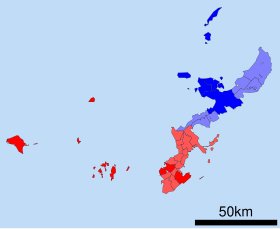From Wikipedia, the free encyclopedia
Guók-tàu-ngṳ̄ (國頭語) sê diŏh Nĭk-buōng Liù-giù buô-hông dê-kṳ̆ tŭng-hèng gì siŏh cṳ̄ng ngṳ̄-ngiòng, iâ sê Nĭk-Liù Ngṳ̄-hiê Liù-giù-ngṳ̄-cŭk (日琉語系琉球語族) â-dā̤ gì ngṳ̄-ngiòng[2], gōng ciā uâ gì dŭ liāng ô 5000 ciáh nè̤ng.
| Guók-tàu-ngṳ̄ | |
|---|---|
|
ヤンバルクトゥーバ 山原言葉 | |
| Huák-nguòng guók |
|
| Sāi-ê̤ṳng dê-kṳ̆ | Chṳ̆ng-sìng-gâing |
| Mìng-cŭk | Liù-giù-cŭk |
| mū-ngṳ̄ sāi-ê̤ṳng-ciā | 5000 (2004)[1] |
| ngṳ̄-hiê |
Nĭk-Liù Ngṳ̄-hiê
|
| ùng-cê hiê-tūng |
Háng-cê Gā-miàng |
| Guăng-huŏng dê-ôi | |
| guăng-huŏng ngṳ̄-ngiòng | 無 |
| ngṳ̄-ngiòng dâi-mā | |
| ISO 639-3 |
xug |
| Glottolog |
kuni1268 |
 | |
| Ngùi-hiēng tiàng-dô | |
|
Definitely endangered (UNESCO) ngùi-hiēng | |
Seamless Wikipedia browsing. On steroids.
Every time you click a link to Wikipedia, Wiktionary or Wikiquote in your browser's search results, it will show the modern Wikiwand interface.
Wikiwand extension is a five stars, simple, with minimum permission required to keep your browsing private, safe and transparent.